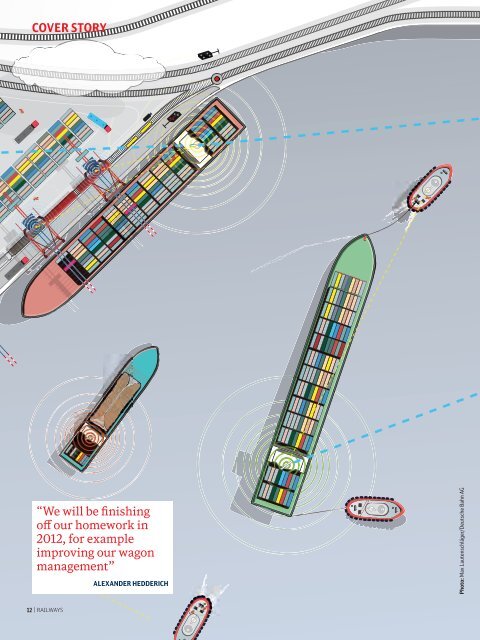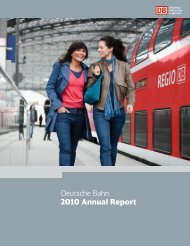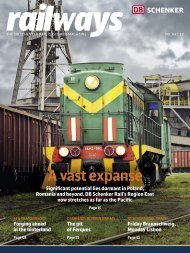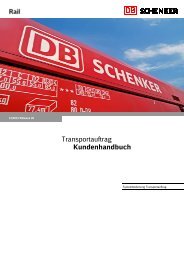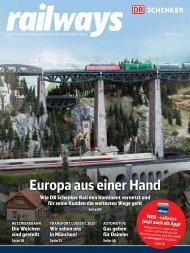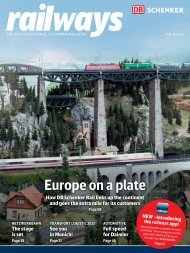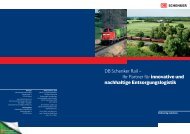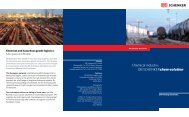You also want an ePaper? Increase the reach of your titles
YUMPU automatically turns print PDFs into web optimized ePapers that Google loves.
CoVeR stoRY<br />
“We will be finishing<br />
off our homework in<br />
2012, for example<br />
improving our wagon<br />
management”<br />
ALexAnDeR HeDDeRICH<br />
Photo: Max Lautenschläger/Deutsche Bahn AG<br />
developments, and the majority of transports will<br />
then be switched over in 2014.<br />
Will you be pursuing your commitment to Xrail for international<br />
single wagon transport?<br />
With the network railways, we are developing the<br />
single wagon transport model for the future. We<br />
were on the defensive for years before taking action<br />
with the international Xrail initiative. Together<br />
with our partner rail companies, we will not only<br />
retain single wagon transport, but continuously<br />
improve it in the long term, for example with tracking<br />
and tracing and contractual arrival times.<br />
The German <strong>DB</strong> <strong>Schenker</strong> <strong>Rail</strong> company showed low<br />
profits in 2011, despite growth in traffic volumes.<br />
The European structure of our business has stood<br />
its ground; <strong>DB</strong> <strong>Schenker</strong> <strong>Rail</strong> is in the black and<br />
was able to improve results. In view of the increase<br />
in transport performance and turnover in the first<br />
half of 2011 in Germany, we expected to be back to<br />
pre-crisis levels here, too. Because of the clear economic<br />
downturn in the second half of the year, this<br />
did not take place. Furthermore, there are structural<br />
reasons on the expenditure side, such as for<br />
our maintenance on goods wagons due to the<br />
stricter maintenance regime after the accident in<br />
Viareggio. In addition to this, the 2009 crisis has<br />
left us with high levels of wagon damage and a<br />
backlog of repair work that we had to fit into 2011.<br />
Secondly, we have seen a climb in our factoring<br />
costs such as railway electricity or personnel to an<br />
extent that we were unable to cover them with<br />
price rises or higher business productivity.<br />
What are the prospects for 2012?<br />
The start of the year has still been relatively weak,<br />
but we expect to see a noticeable improvement in<br />
the economy in the second quarter. Above all, we<br />
will be finishing off our homework in 2012, such<br />
as improving our freight wagon management. We<br />
will be looking at how we can optimise transport<br />
using business concepts. To do so, we will be talking<br />
to our customers; we already have a number of<br />
solutions that we’d like to put forward. <strong>Rail</strong> freight<br />
transport is a growth market that is set to increase<br />
by some 35 per cent by 2020. We want to be part<br />
of this development. Our aim is to be the best rail<br />
freight company in Europe for our customers.<br />
ALexAnDeR HeDDeRICH<br />
was born in 1965 in Wetzlar, studied<br />
economics in Gießen and worked as a<br />
research assistant in the department<br />
headed by the well-known transport<br />
scientist Gerd Aberle until he obtained<br />
his doctorate in 1996. After an interlude<br />
with a Düsseldorf-based corporate<br />
consultancy, he joined Deutsche Bahn<br />
in 1999. From 2004, Hedderich was responsible<br />
for the group’s development<br />
at the <strong>DB</strong> head offices in Berlin before<br />
moving to <strong>DB</strong> <strong>Schenker</strong> <strong>Rail</strong> in Mainz as<br />
chairman in September 2009.<br />
12 | <strong>Rail</strong>ways <strong>Rail</strong>ways | 13


